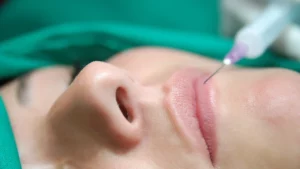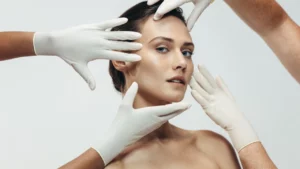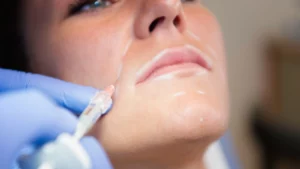Table of Contents
New skincare ingredients come and go as trends pass us by, but some cult ingredients always carry a certain level of intrigue with them—retinol is one such skincare ingredient.
It’s touted to be a solution for chronic acne, clearing up acne scars, signs of aging like lines and wrinkles and also boosts overall cell turnover.
But it comes with its own set of rules when usage is up for conversation. Read on for our guide to everything you should know about retinol and how it can benefit your skin.
What is retinol?
Retinol is a derivative of Vitamin A and is part of the chemical compound family of retinoids. While there are multiple derivatives in differing chemical strengths that are part of the retinoid family, retinol is one of the most commonly known.
Retinol is also one of those ingredients that is available in different concentrations over the counter and by prescription only due to its strength and potency.
While the milder version is available to use in balanced formulas by hundreds of skincare brands, stronger formulas are only available at chemists when prescribed by your dermatologist.
The concentration of retinol in over the counter products usually ranges between 0.1% and 1%. However, anything stronger needs to be prescribed by a skin expert.

What does retinol do?
The primary benefit of using retinol as part of skincare is its ability to regenerate skin and bring healthier skin to life. It helps treat acne from the mid-layers of your skin, reduces visible signs of aging like fine lines and wrinkles and helps your skin rejuvenate with every application.
Benefits of using retinol
There are multiple reasons why retinol is touted to be the wonder skincare ingredient it is. Here’s why dermatologists and clients love it as much as they do:
- Helps clear acne
- Promotes cell turnover and rejuvenation
- Prevents fine lines and wrinkles
- Slows down the emergence of visible signs of aging
- Repairs damaged skin cells
- Helps improve skin texture
Side effects of retinol
While retinol is an extremely effective skincare ingredient, it comes with its own share of side effects that may or may not affect everyone using it.
This is why it’s very important to patch test even an over the counter retinol-based product and to gradually incorporate it into your skincare routine.
The most common side effects include:
- Skin dryness
- Redness
- Increase in sensitivity
- Sun damage when used without a broad spectrum sunscreen
When should you begin using retinol?
You should ideally begin using retinol after the age of 25 to prevent micro-aging. When you hit the age of 30, retinol makes for a great addition to your skincare routine to keep collagen production going at the optimum speed.
When you hit your 20s, your skin’s capabilities to produce collagen start to deplete which makes retinol the perfect aid to help keep the skin regeneration process going.
While you can start at 25, if you have perfectly healthy skin, your early 30s are the time to include retinol as part of your skincare routine.
Various applications of retinol
Retinol is most commonly used in the form of a serum or gel, a topical treatment especially for acne or when formulated as an overnight cream or mask.
Prescription retinol usually goes by the name of tretinoin or adapalene, especially in the case of acne treatment. Isotretinoin can also be consumed in the form of a tablet and is often prescribed as a treatment for body acne.
When should you avoid retinol?
It’s best to avoid retinol if you have very sensitive skin or are pregnant. If your skin doesn’t agree with active ingredients, have a chat with your dermatologist before giving even the lowest strength of retinol a shot.
What is the best time to apply retinol?
Retinol makes your skin sensitive to the sun’s UVA and UVB rays making the night the best time to apply it. If you’re going to be heading to a beach vacation or know that you will be finding yourself exposed to the sun for long hours on end, it’s time to stay away from the retinol for a few days or weeks.
What should you keep in mind before applying retinol?
- Make sure you’re not using any physical or chemical exfoliators when using retinol. Retinol acts as an exfoliator in itself and excessive exfoliation can excessively dry out your skin.
- Always moisturise skin after using retinol to keep it hydrated and prevent peeling.
- It’s best to use retinol as part of your nighttime skincare routine as it can make your skin photosensitive and cause pigmentation when exposed to sunlight.
- Ensure you inform your dermatologist of any other medication you may be on or any active ingredients you’re using in your skincare to make sure that it doesn’t interfere with the effects of retinol.
- If you know you’re going to be exposed to the sun for prolonged hours the next day, it’s best to not use retinol to avoid the effects of sun damage on your skin.
Retinol cream vs serum: which one is more effective?
As is the case for most skincare ingredients, serums tend to be a more potent formula than creams. However, when retinol-based products are in question, using a cream-based formula to start with may be your best bet to avoid excessive skin dryness.
Once your skin is accustomed to retinol and shows no negative reactions to it, you can try a serum (under your dermatologist’s guidance) to further benefit from it.
Best retinol-based products recommended by Isya:
- Correction fluide
- Retriderm gel
- Retiage cream
- Zein obagi retinol skin brightener







